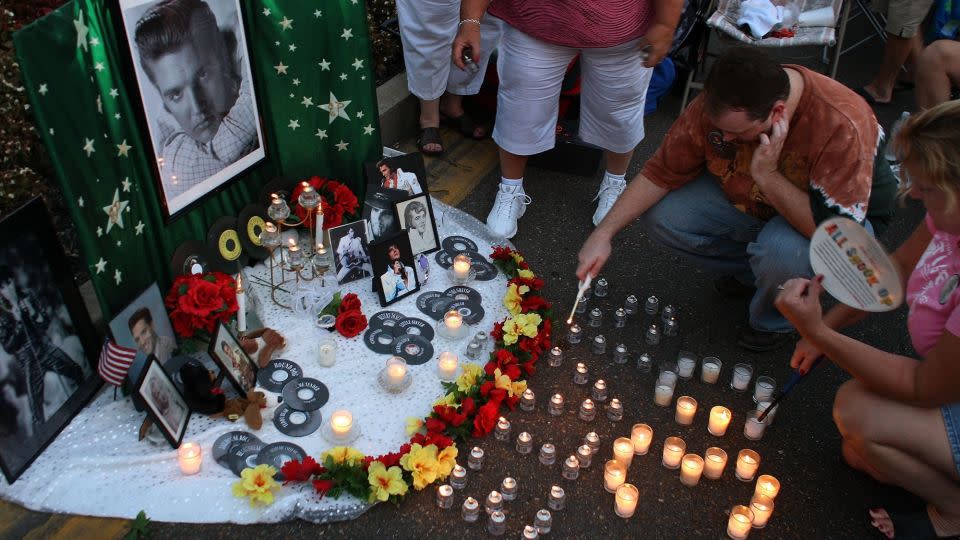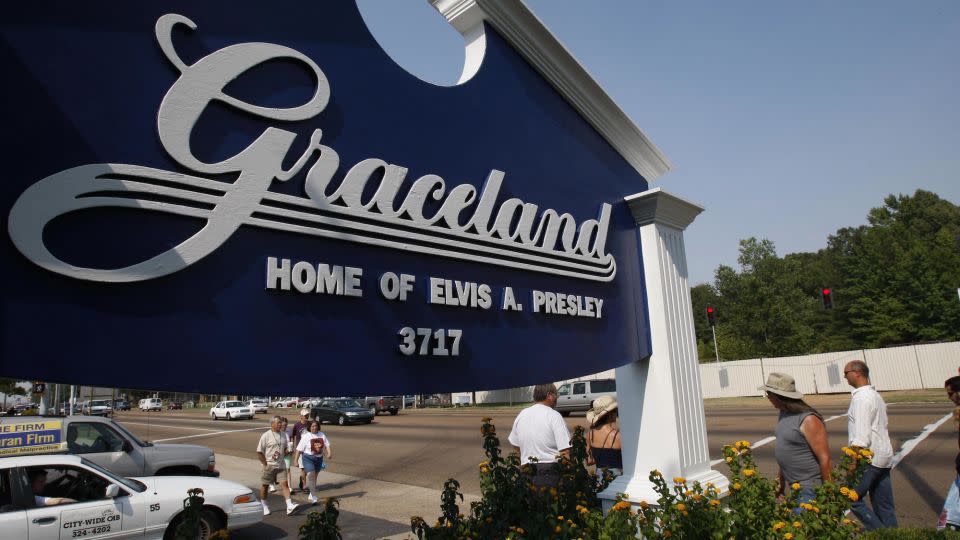Opinion: Before Graceland was a tourist attraction or a scam target, it was a home – in every sense of the word
Editor’s Note: Michael T. Bertrand is a professor of history at Tennessee State University. He is the author of “Race, Rock and Elvis.” The opinions expressed in this commentary are his own. View more opinion on CNN.
The recent and bizarre attempt to wrest control of Graceland, the Memphis, Tennessee, home of the late Elvis Presley, set off a number of red flags. It was a brazen act that served as a stark reminder that scammers constantly prowl the internet, and that fraudulent schemes targeting the heirs of estates and the elderly from various segments of society occur more frequently than the general populace is aware.

For many, the failed con also provided the opportunity to recall the power of Graceland as a symbol, a marker for how connected fans around the world feel to the dynasty of the Presley family, from Elvis himself to wife Priscilla, daughter Lisa Marie and granddaughter Riley Keough (whose efforts to thwart the Graceland scam brought the situation into world headlines). At the same time, one cannot consider this world-famous tourist site without remembering that it was first a home, one that evokes Elvis’s rags-to-riches evolution from his 1935 birth in a tiny East Tupelo, Mississippi, shotgun shack to his death 42 years later in the upstairs of his 23-room Colonial Revival mansion.
The differences between the two homes were vivid. Elvis, still awestruck after many years at his Memphis residence, once told a journalist friend that the two-room house where he was born — built by his grandfather, father and uncle — would have fit snugly in Graceland’s living room. Indeed, the son of sharecroppers had come a long way.
It is no surprise that Elvis’s version of the American Dream has captivated the world over. His life is one bedazzled chapter in a centuries-long story that has been one of the most successful commodities that the United States has produced. Born without a feudal legacy or landed aristocracy, the country adopted a narrative that emphasized wealth acquisition rather than family lineage as one’s passport to success. For much of US history, this emphasis encouraged various marginalized yet enterprising individuals — including the likes of John D. Rockefeller and Andrew Carnegie, among many others — to pioneer breakthroughs in their chosen fields. The triumph over poverty of such individuals, who in turn created dynastic legacies, captured the imagination of people in this country and beyond.
But Elvis represents something different from Gilded Age robber barons such as Rockefeller and Carnegie, whose American Dream was fundamentally about the accumulation of wealth. Elvis’s American Dream was of a different time and place. His characteristics and achievements were unique. Yet he, too, captivated the larger public. Graceland, perhaps, may be a large reason why.
In much of southern culture, the home is considered the center of family and moral stability. It is the anchor that guards against the forces of a modern society that undermine traditional values. It is a source of stability. And as cultural writer and editor Ida Harris explains, “My physical home is a tangible representation of my identity but performs more like archival space, housing the more intimate details of who I am.”
By contrast, for a long time the Presleys were without an “archival space” that future generations could access. Poverty and indebtedness prompted them to move eight times between Elvis’s birth and 1948, the year the family migrated to Memphis. “Seems we was always in debt,” recalled Gladys Presley, Elvis’s mother. “Can’t hardly remember when we wasn’t. We used to sit on the doorstep talkin’ about our debts. After a while Elvis’d look up, he was just a little fella, an’ he’d say, ‘Don’t worry none. One of these days things will change.’”
Once in the Bluff City, things did not change — the family kept moving, primarily renting apartments or houses and also living in a government-subsidized housing project. As Elvis later recalled, “I can never forget the longing to be someone. I guess if you are poor you always think bigger and want more than those who have everything when they are born. We didn’t…So our dreams and ambitions could be much greater because we had so much farther to go than anyone else.”

In every domicile they inhabited, no matter how briefly, the Presleys contributed to the existing community. Gladys made friends and socialized easily with neighbors, folks in a similar socio-economic situation. They all were transient and “throwed-away” people, occupying the penultimate rung on a southern hierarchical ladder that stressed both race and class. They were expected to know their place, as in stay in it. This was different, of course, from having a sense of place, a feeling that came from permanence and owning a home.
Consequently, despite the over one billion records sold and the over 150 albums and singles that have been certified gold or platinum in the United States alone, Graceland in familial and cultural terms arguably symbolizes Presley’s greatest success.
Elvis bought Graceland, the second house he had purchased following his rise to entertainment stardom, in 1957.
Nearly a year earlier, he had acquired for his parents a ranch-style house situated in an upper middle-class suburb in Memphis. Like country people migrating to both southern and northern cities, the Presleys carried with them their working-class cultural baggage, mores that often were offensive to earlier waves of migrants who had put their rural pasts behind them.

Neighbors complained about Gladys growing a garden, hanging clothes and raising chickens on her property and said the Presleys were an embarrassment. She frequently drove to the housing project from which they had recently moved to visit with old friends. She had not made any new ones where they now resided. After nearly a year, Elvis sought a different home. The family eventually found Graceland.
Immediately after moving into Graceland, Elvis, the ultimate consumer, began renovations. His approach to home decorating was unrestrained; everything he liked found a home in his home. It was the same approach he utilized in his musical and clothing choices.
Significantly, the cultural establishment always viewed Elvis as a tacky provincial. Any success he attained was accompanied by an asterisk lampooning him as a “Horatio Alger in drawl.”
When working, Elvis resided in Hollywood and Las Vegas, but he lived at Graceland. It was his home. It was his refuge. Memories of his mother, who died in 1958, filled every room. The house provided a sense of place, an archival space where he could find stability and be comfortable with who he was.
Graceland was not Kykuit, John D. Rockefeller’s 40-room estate in upper New York. Neither was it Andrew Carnegie’s three-story mansion on 5th Avenue in Manhattan. Those homes conveyed a different style. They possessed a different meaning. They symbolized a different type of success.
Graceland was the home of a man born in a shotgun shack without indoor plumbing who reached the greatest heights imaginable, yet never forgot who he was or where he came from. For the many who have made it the second most visited home in America behind the White House, that was all that mattered.
For more CNN news and newsletters create an account at CNN.com


